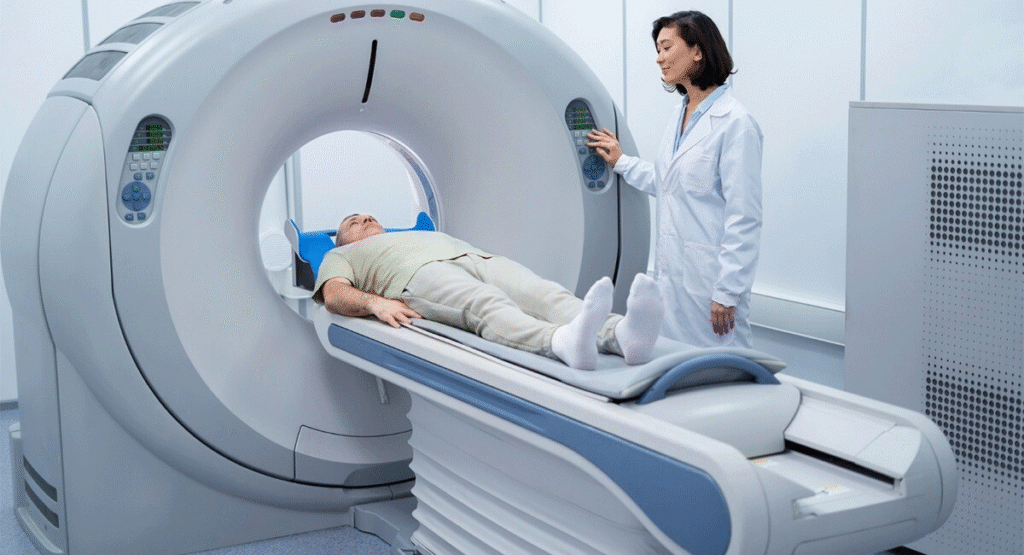When it comes to diagnosing internal issues quickly and accurately, an abdominal CT scan is one of the most powerful tools in modern medical imaging. Whether you’re dealing with unexplained abdominal pain, a suspected injury, or need ongoing monitoring of a known condition, CT scans provide high-resolution, cross-sectional images that give healthcare professionals a clear picture of what’s going on inside your body.
With on-site imaging capabilities now available at many urgent care and specialty clinics, getting a scan has never been faster or more convenient.
What Is an Abdominal CT Scan?
An abdominal CT scan (computed tomography scan) uses a series of X-rays taken from different angles to create detailed images of the organs, bones, blood vessels, and soft tissues inside your abdomen. These scans can help identify:
- Infections and abscesses
- Kidney stones and gallstones
- Tumors, masses, or cysts
- Abdominal injuries
- Internal bleeding
- Inflammatory diseases like Crohn’s or pancreatitis
What Can an Abdominal CT Scan Detect?
Abdominal CT scans are incredibly useful for diagnosing a wide range of conditions. They can reveal issues such as:
- Abscesses or internal infections
- Appendicitis and hernias
- Blockages in the bile ducts
- Gallbladder inflammation (cholecystitis)
- Crohn’s disease and ulcerative colitis
- Pancreatitis and kidney problems like stones or swelling
- Masses and tumors, including cancers of the colon, kidneys, ovaries, and pancreas
- Injuries to abdominal organs
Beyond identifying the cause of pain, fever, or blood in the urine, abdominal CT scans also assist physicians in guiding biopsies, planning surgeries, and administering targeted cancer treatments like radiation or chemotherapy.
Preparing for Your Abdominal CT Scan
To ensure accurate results and a smooth experience, follow these preparation tips:
- Wear loose, comfortable clothing, as you may be asked to change into a hospital gown. Avoid metal jewelry, eyeglasses, or clothes with zippers or underwire, as metal can interfere with imaging.
- Contrast dye may be used to highlight certain tissues and blood vessels. If required, you might need to fast for up to four hours before the scan.
- Notify your doctor about:
- Any allergies, especially to iodine or contrast material
- Medical conditions like asthma, kidney or thyroid disease, heart issues, or diabetes
- Pregnancy or recent illnesses
- All medications or supplements you’re taking
- Any allergies, especially to iodine or contrast material
Following these steps can help prevent complications and reduce scan delays.
What to Expect During the Scan
If contrast is used:
- It may be administered through an IV in your arm or hand.
- You may experience a warm sensation or a metallic taste, which are normal and typically fade quickly.
- Some patients may receive oral contrast, which can have a temporary unpleasant taste.
During the scan:
- You’ll lie on a narrow table that slides into the CT scanner (a large, doughnut-shaped machine).
- The machine captures detailed cross-sectional images of your abdomen.
- Some scans may require multiple passes through the scanner.
You may be asked to hold your breath briefly to avoid motion blur.
The scan itself typically takes about 10 minutes and is fast and painless.
If lying still causes discomfort, relaxation medication may be an option. Talk to your physician.
Why Choose Exceptional Emergency Center for Your Abdominal CT Scan?
At Exceptional Emergency Center, we bring advanced imaging technology directly to you through our On-Site Imaging services. Whether you’re visiting for urgent care or scheduled diagnostic testing, we prioritize fast turnaround, expert interpretation, and compassionate service. Our facility is equipped with cutting-edge CT technology, ensuring accurate results without the need for long hospital wait times. When you need clear answers and timely care, Exceptional Emergency Center is here to help you move forward with confidence.

